- Home
- John Jakes
The Rebels: The Kent Family Chronicles Page 28
The Rebels: The Kent Family Chronicles Read online
Page 28
Cowper’s chest barely moved, so thin was his breathing. Philip thought he couldn’t stand there an instant longer—
“Appreciate your assistance, soldier,” the surgeon told him. The man rubbed a red hand across his lips and gestured to Cowper’s still form. “Clear him away and bring the next one.”
His eyes returned to Philip.
“There’s hot water outside. You can wash up. You look like you took a bath in somebody’s blood. I hope it was one of the British.”
iv
Outside, the near-scalding water dipped from a kettle hanging over burning logs restored Philip to some semblance of sanity. But that was almost worse than the semi-delirium of his twenty or thirty minutes in the hospital tent.
Drying his face on a rag from the ground, he tried to shut out the almost continual din of shouting and screaming from the other side of the canvas walls. It was impossible—just as winning this accursed war was impossible—
A face, bright red hair, caught his attention from the other side of the fire. The Marquis de Lafayette’s fine uniform was stained and torn in several places.
“Philip! I thought I glimpsed you when I rode in. Thank God you’ve survived the day—”
Gil hobbled around the fire. Only then did Philip see the bandage tied tightly around the trouser leg. A ball had torn the outside of Gil’s left thigh a few inches below the groin.
Gil gestured to the hospital tent:
“Were you wounded in the’ action? I notice no evidence of it—”
Too tired to speak immediately, Philip shook his head. Then:
“Man from my unit lost an arm. I brought him here.”
There was a strange despair in Gil’s eyes. He tried to conceal it with a shrug and a weak smile:
“Well, as you can see, messieurs les anglais favored me with a gun-shot. It’s trifling. I shall wait until the doctors finish with the urgent cases.”
“Where were you when you were, hit?”
“I do not know, exactly. General Sullivan’s men were all around me. I was endeavoring to urge them to turn and stand when the ball knocked me from the saddle—”
His eyes shifted toward the bedlam of the tent; a man was baying like an animal. His face wrenched:
“I have never seen such chaos! Or such cowardice! A formal retreat is one thing—the enemy carried the day decisively. But these men run like hares. To control them—to command them—it can’t be done!”
Philip sighed. “I guess that’s why we keep losing battles.”
“The laxity I saw when I first rode into the encampment will be our undoing!” Gil fumed. “Undisciplined children running helter-skelter, disobeying orders at their whim, cannot defeat the British. Only an army can defeat them.”
Philip’s face, still marked with dried blood at the hairline and around the ears, looked utterly weary and despondent:
“I know, Gil. And that’s the one thing we still don’t have.”
Gil’s silence represented total agreement.
v
The Brandywine position was lost on the eleventh of September. For two more weeks the rival armies feinted and skirmished through the countryside around Philadelphia. Then the beaten Americans withdrew to erect a temporary camp at Pennybacker’s Mill, on a creek that flowed down to- join the Schuylkill. The first hint of autumn nipped the air as Philip and the men in his mess—now down to three with Pettibone and Adams dead and Cowper off in a recovery area—wearily raised their tent.
Philip had visited Lucas Cowper once. Although conscious, the farmer refused to speak or even acknowledge Philip’s presence. A stained bandage was pinned over the stub of Cowper’s arm. He lay staring at the roof of the recovery tent, never blinking. After asking a score of quiet questions and receiving no answers, Philip crept away, totally depressed.
He tried to remember that if every man in the army allowed himself to fall prey to an erosion of the spirit such as he was again suffering, the struggle was already over for good. But it was hard to keep going; hard to be at all encouraged in the face of a shambles like the Brandywine. And its equally humiliating aftermath:
“It’s ’ficial,” Breen announced, late in the afternoon of the twenty-seventh. He’d just come from the sutler’s.
“What’s official?” Royal Rothman asked in a listless voice.
“Every man-jack in the Congress skedaddled out to Lancaster a week ago. And yesterday, ol’ Cornwallis marched the grenadiers into Philadelphia.”
“So the city’s fallen?”
“’Pears so, Royal. All the damned Tories should be mighty happy.”
“What the devil happens to us?”
“Oh, we just go on drawin’ our liquor ration an’ doin’ what they tell us. Be winter soon. Doubt there’ll be much more fightin’.”
Having listened in gloomy silence, Philip burst out, “Why don’t we try to re-take Philadelphia, for God’s sake?”
Breen shrugged in a laconic way. “Have to ask General George about that. But I wouldn’t, even if I had the chance. I understand he’s in mighty mean spirits. Maybe your Frenchy friend could tell you. I sure God can’t.”
Breen scratched his belly, hiccoughed, took a couple of wobbly steps toward the tent, pivoted back:
“Oh—and ’fore you ask, no, they ain’t payin’ us. Again.”
“We haven’t seen a penny in three months!” Royal protested.
Breen shrugged. “What’s the difference? You can’t hardly spend them bills they printed up for the paymaster. Only place they’ll take ’em ’thout a bitch is the sutler’s. I heard half the colonies—”
“States,” Royal corrected primly. Breen ignored him:
“—is makin’ jokes about the money. ‘Not worth a Continental’ is what they call somethin’ absolutely not worth a damn.”
Breen lifted the tent flap, acting unusually sober all at once.
“Sure’s funny ’thout old Pettibone hangin’ around. S’pose they’ll send us some green replacements, Philip?”
“Eventually.”
“An’ Cowper—what the devil’s that poor feller gonna do? He told me once his daddy couldn’t work no more. Too old. So there wasn’t nobody except Lucas to tend the farm.”
“I don’t know what he’ll do. I don’t want to think about it.”
“You was there when they sawed—”
“Yes, I was there. Shut up about it!”
A moment of silence. Breen looked contrite:
“Sorry.”
“Yes—me too.”
Breen rolled his tongue in his cheek. “You’re an all-right sort, Philip. I don’t ’pologize to no other kind, y’know. That’s why I can admit I don’t miss Mayo Adams one whit. Wonder what become of him?”
Philip studied the sky. “Took a British or Hessian ball, probably.”
“Yeh, probably.”
Breen pulled up his hunting shirt to scratch his stomach again. Philip noticed a wrinkled sheet of paper stuck in the older man’s hide belt.
“Breen, what’s that?”
Fuzzily, Breen peered down. “My bellybutton.”
“No, dammit, that—” He pointed.
“Well, damme if it didn’t clean slip my mind. Fer you—”
As he pulled the paper loose, Philip practically leaped for it:
“A letter?”
“Yessir, mail finally come through. Picked it up ’fore I bought my ration. Clean forgot I had it. Maybe it’ll perk your spirits up some. Royal, when the hell you gonna start our cook fire? I’m hungry as a grizzly cub in April—” Blinking, he ambled on into the tent.
Philip almost whooped for joy as he examined the badly wrinkled letter. The handwriting was Anne’s.
He tore the letter open, read the date—late July—swiftly skipped down the lines for the essential details, his spirits soaring:
His wife was well.
Abraham was growing, talking and in good health.
Captain Caleb’s two new privateers were nearing completi
on on the ways at Sawyer’s.
The final paragraphs riveted his gaze and turned him, cold.
I do not wish to put additional worry on you when your task is difficult enough, my dearest. But at the moment, there is no one else with whom I can share a problem that is proving troublesome.
I have received two notes from Will Caleb’s hired captain, Mr. Rackham, whom I am certain you recall. In each, he has invited me to Sawyer’s to view the vessels under construction—which struck me as an altogether suspect invitation, considering his behavior that day last winter. Neither missive received an answer, of course. However, my silence did not end his improper interest. Indeed, it produced two visits from the obnoxious man, on our very doorstep here in Cambridge.
Both were likewise of the briefest nature. I let him know I did not welcome his attentions. He seemed to treat the reply as a joke. I am honestly fearful the fellow is a reckless libertine, no doubt encouraged by the thoughtless talk of some women whose husbands are away serving; such women proclaim their loneliness to any available male who is not in his dotage. So upsetting were Rackham’s smiles and hints, I have decided to ask our neighbor Mrs. Brumple to share the house with me. She craves company, and I believe her presence would help deter any further forwardness on Rackham’s part.
At first I hesitated to mention the matter to you, dear husband. Yet here I am pouring out my concerns in an unseemly way. With you so distant, a great portion of that strength of which I have sometimes foolishly boasted now seems altogether lacking—proof, if it were needed, that man and wife become a new whole, far different from what each might have been as an individual. What I am attempting to do, I suppose, is to reassure both myself and you that nothing is amiss—and that with Mrs. Brumple occupying the spare room, no further difficulty could arise.
I can also promise you that at the first opportunity, I shall speak to Captain Caleb about his associate’s unwelcome overtures. However, the captain is presently put out into the ocean with Eclipse for a week or two, during which time her guns and procedures for operating same are to be brought into perfect trim. I will contact him the moment he returns to Boston Harbor.
God protect you, my beloved, and may your son and your eternally affectionate wife soon be blessed with your presence, or, until that joyous day, further word that you are safe and well.
Ever yours,
Anne.
The cool September breeze fluttered the page. Philip stared at the amber clouds and a flight of wild geese streaming toward the southern horizon. But he saw only the insolent face of Captain Malachi Rackham.
That night he actually thought about desertion; about damning this futile war and hurrying home.
Tempting though the idea was, he put it out of mind because he knew that it was wrong for him, no matter how anyone else chose to act. It was also wrong because it would be the most foolish kind of weakness to give in to fears that were, for the moment, of small substance. Anne was taking steps to deal with the problem of Rackham. Those steps would probably prove effective.
The mere thought of desertion made him ashamed for other reasons, too. If he did what many had already done—simply went home the moment he felt like it—he would be one of those whom Tom Paine scathingly denounced as summer soldiers; sunshine patriots. More important, if mass desertions continued, there would soon not even be a semblance of an army left. And the larger purpose, of which the army was the sole instrument of fulfillment, would be lost. He believed in what the army was fighting for, even though up till now most of the fighting had been poorly done.
He had come to his belief over a long period of years, with much doubt along the way. But he did have an unashamed conviction that the cause was just. To leave would betray both the cause and the conviction.
And, finally, it would betray Anne.
A deserter who appeared suddenly in Cambridge would not be the man she’d taken as a husband. He’d wait for the next letter. It would contain less disheartening news. Confirmation that Caleb had brought his captain to heel. Surely it would—
With struggle, he almost convinced himself of that.
CHAPTER V
“I Mean to March to Hostile Ground”
JUDSON FLETCHER RODE like a man pursued.
Lather streaked the flanks of his horse. He knew he’d already pushed the animal much too hard, covering the sixty-mile distance with only very brief stops. He’d been in the saddle most of the night, his stained coat not nearly warm enough to protect him from the bite of the late October air.
From the east, first light gilded the shocked corn standing in the fields. A yawning farmer loading fat pumpkins into a wagon gave him a startled stare as he hammered along the dirt road, plumes of breath streaming from the horse’s muzzle.
What if I’m too late? What if he’s gone?
It was Donald, day before yesterday, who had dropped the casual remark that sent Judson speeding south. Donald had come by the Shaw cabin with another purse; the dole was delivered more grudgingly with every visit.
Judson’s appearance had worsened over the summer. He’d lost more weight. He was lethargic; sullen; constantly unshaven.
Still, as always, Donald dutifully tried to spark some reaction from his brother with reports on various aspects of the war, starting with the loss of Philadelphia to General Howe’s army in September. That had caused sharp criticism of General Washington even among his fellow Virginians, Donald said.
One bright circumstance offset the fall of America’s largest city: the surrender of Gentleman Johnny Burgoyne’s expeditionary force at Saratoga just a couple of weeks ago.
Expecting reinforcements in the form of troops under General Howe, Burgoyne had instead been virtually abandoned in the York State, while Howe pursued his conquest of Philadelphia—then settled in, presumably, to enjoy the favors of his mistress. Outnumbered three to one by the Americans under General Gates, Burgoyne asked for terms. It was the sole piece of encouraging news in an otherwise bleak cavalcade of disasters and defeats:
“Unless you wish to count the end of the verbal war over the Articles of Confederation,” Donald told his brother. “I understand a draft is just about ready.”
For over a year Congress had been debating the wording of a document that would organize the thirteen states into some kind of working relationship; stipulate areas of authority; divide financial responsibility for the war fairly—
“They finally worked out a plan where expenses of the central government will be apportioned according to each state’s surveyed land, which I suppose is fair. We won’t properly be a country until every one of the thirteen ratifies the draft Articles, though. Considering how long it’s taken to get the material written and agreed upon, that may not happen till the next century! Even if the Articles are accepted, they leave much to be desired.”
Judson’s vague murmur was enough to prompt Donald to continue:
“Every state retains its sovereignty, and the Congress is granted jurisdiction only in certain limited areas. It can declare war—but can’t wage it unless each state approves. There’s a proviso saying Congress may borrow money, but not a single word about how the central government may raise money to repay the loans. In short, if the Congressional fiddler wants to play a tune, the states collectively pretty well tell him yea or nay.”
“I’d hardly compare that kind of document to a military victory,” Judson observed sourly.
“True. But what other accomplishments can we brag about?”
“Why not save your breath altogether?”
“I probably should. The Articles are a patchwork. Too many basic questions dodged while everyone’s diverted by lofty sentiments about ‘perpetual union.’ The best you can say is that it’s a start. It seems to me that a more clearly and thoughtfully drawn statement will be required before very long. Some sort of formal constitution—”
Judson’s apathetic stare showed he’d completely lost interest. Donald smiled sadly:
“I’m not prec
isely enthralling you with all this, am I?”
Judson shrugged, as if to ask what else his brother expected. Donald sighed. Then:
“Well, perhaps something more personal will pique your interest. Your friend George has been at Williamsburg for a fortnight now—by the Lord! A response at last!”
It was true. Judson’s blue eyes finally showed something other than contempt or indifference:
“What’s he doing there?”
“Damme if I can tell you. Something big’s afoot, though. He’s been attending secret meetings with a special committee appointed by Governor Henry—Mr. Jefferson, Mr. Wythe and several other Burgesses. The meetings last for hours at a time. They must be debating something besides another request for powder to defend the Kentucky forts.”
“Have you seen George personally?”
“Yes, I talked to him at the Raleigh Tavern before I rode home.”
“How does he look?”
“Very fit. But worried. Conditions in the west are growing worse. All the tribes rising against the settlers—my guess is that George came east to raise some additional militia units. He wouldn’t tell me specifically.” A pause, as Donald eyed his disheveled brother. “He asked about you.”
“What did you tell him?”
“Exactly what I tell Father. As little as possible. I imagine Tom Jefferson and some of the others talk more freely—”
Judson glanced away.
“George sent you his regards. Also his regrets that he couldn’t stop by for a visit. I got the impression he’ll be bound back for Kentucky soon after the secret meetings are concluded.”
At that exact moment, Judson felt as if a door had opened; perhaps the last one remaining for him.
It was a desperate, perhaps foredoomed hope. But confinement on the tiny piece of cabin property had grown intolerable. Too often, he found his thoughts turning to the means for suicide.
He said nothing to his brother about the sudden idea that fired his mind and restored his energy all at once. But shortly after Donald had gone back to Sermon Hill, Judson was mounted and riding south.

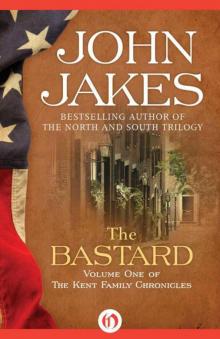 The Bastard
The Bastard The Furies
The Furies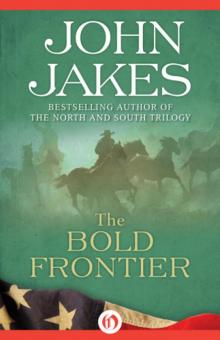 The Bold Frontier
The Bold Frontier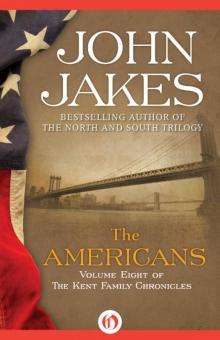 The Americans
The Americans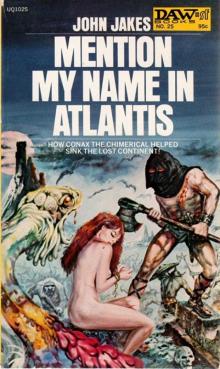 Mention My Name in Atlantis
Mention My Name in Atlantis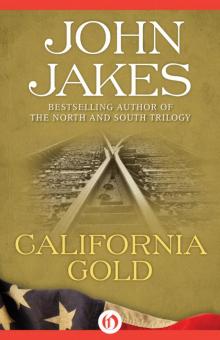 California Gold
California Gold North and South
North and South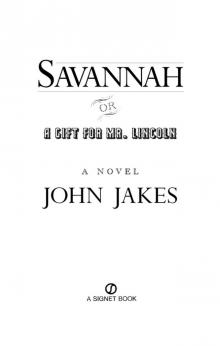 Savannah, or a Gift for Mr. Lincoln
Savannah, or a Gift for Mr. Lincoln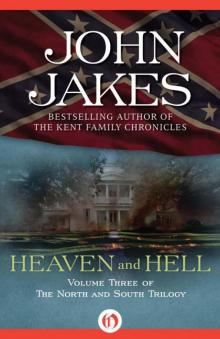 Heaven and Hell
Heaven and Hell Homeland
Homeland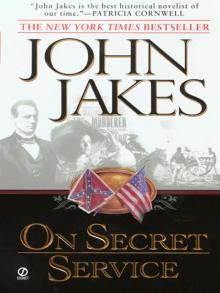 On Secret Service
On Secret Service The Lawless
The Lawless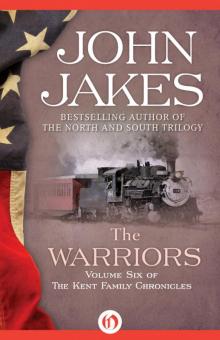 The Titans
The Titans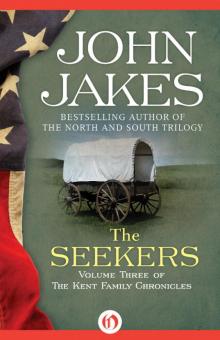 The Seekers
The Seekers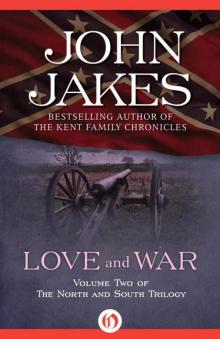 Love and War
Love and War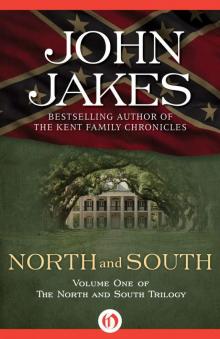 North and South: The North and South Trilogy (Book One)
North and South: The North and South Trilogy (Book One)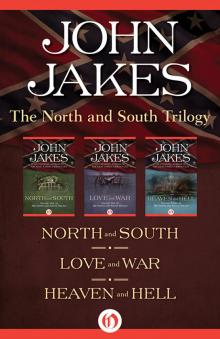 North and South Trilogy
North and South Trilogy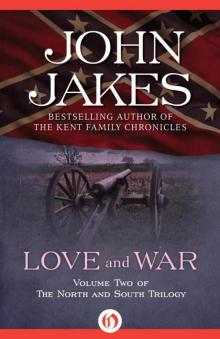 Love and War: The North and South Trilogy
Love and War: The North and South Trilogy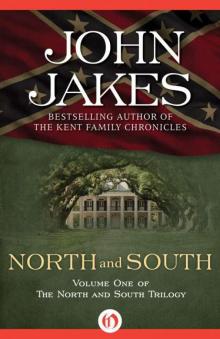 North and South: The North and South Trilogy
North and South: The North and South Trilogy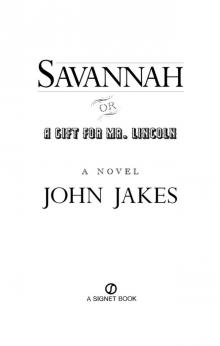 Savannah
Savannah Lawless
Lawless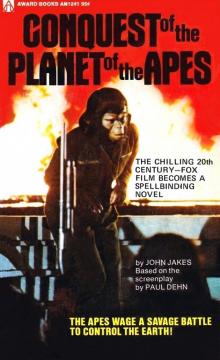 Conquest Of The Planet Of The Apes
Conquest Of The Planet Of The Apes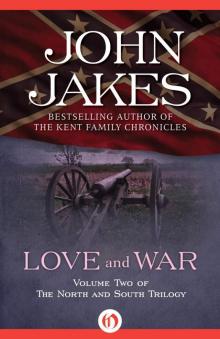 Love and War: The North and South Trilogy (Book Two)
Love and War: The North and South Trilogy (Book Two)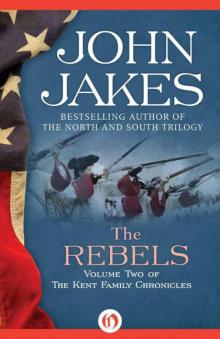 The Rebels: The Kent Family Chronicles
The Rebels: The Kent Family Chronicles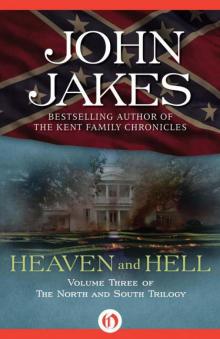 Heaven and Hell: The North and South Trilogy
Heaven and Hell: The North and South Trilogy Planet of the Apes Omnibus 2
Planet of the Apes Omnibus 2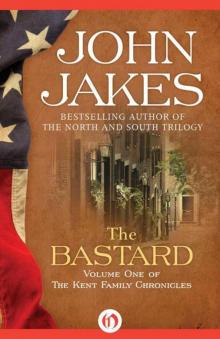 The Bastard: The Kent Family Chronicles
The Bastard: The Kent Family Chronicles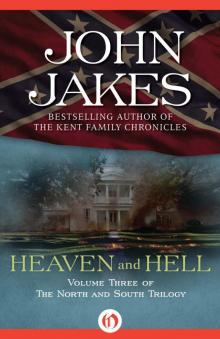 Heaven and Hell: The North and South Trilogy (Book Three)
Heaven and Hell: The North and South Trilogy (Book Three)